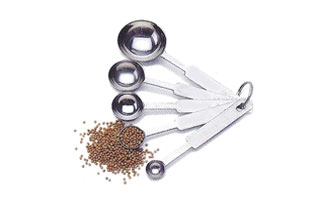|
|
 Cup
Measures Cup
Measures

One of
the secrets
of good cooking is to keep all ingredients in their proportions.
|
Cup (250 mL)
|
Grams
|
Ounces
|
| 1
cup flour |
155
|
5
|
| 1
cup sugar (crystal
or castor) |
250
|
8
|
| 1
cup brown sugar (firmly
packed) |
185
|
6
|
| 1
cup icing sugar (sifted) |
185
|
6
|
| 1
cup butter |
250
|
8
|
| 1
cup fresh bread crumbs
(soft) |
60
|
2
|
| 1
cup packaged dry bread
crumbs |
155
|
5
|
| 1
cup crushed biscuit
crumbs |
125
|
4
|
| 1
cup rice (uncooked) |
220
|
7
|
| 1
cup honey or golden
syrup |
375
|
12
|
| 1
cup mixed fruit or
individual (as sultanas) |
185
|
6
|
| 1
cup nuts (chopped) |
125
|
4
|
| 1
cup coconut (desiccated) |
90
|
3
|
| 1
cup cornflakes or rice
crispies |
30
|
1
|
| 1
cup dried split peas,
lentils |
200
|
7
|
| 1
cup cheese, grated |
125
|
4
|
| 1
cup cocoa |
120
|
4
|
| 1
cup salt |
250
|
8
|
|
|
|
COOKING
Cooking is the act of preparing food for consumption. It encompasses a
vast range of methods, tools and combinations of ingredients to improve
the flavour and/or digestibility of food. It generally requires the
selection, measurement and combining of ingredients in an ordered
procedure in an effort to achieve the desired result. Constraints on
success include the variability of ingredients, ambient conditions,
tools and the skill of the person cooking.
The diversity of cooking worldwide is a reflection of the myriad
nutritional, aesthetic, agricultural, economic, cultural and religious
considerations that impact upon it.
Cooking frequently, though not always, involves applying heat in order
to chemically transform a food, thus changing its flavor, texture,
appearance, or nutritional properties. There is archaeological evidence
of cooked foodstuffs (both animal and vegetable) in human settlements
dating from the earliest known use of fire.
|